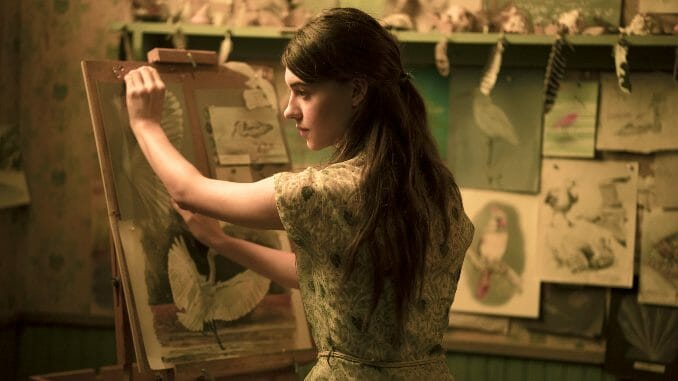Predictable Romance Where the Crawdads Sing Sinks into the Ideological Swamp

From the unwieldy title of Where the Crawdads Sing, you probably expect it to be set down ‘round the parts of America where you’re guaranteed some twang for your buck. Director Olivia Newman’s sophomore feature, based on the bestseller by Delia Owens, surely delivers on that Kentucky Fried notion. Its outsiders, romance and murder all possess the same cartoonish unreality as the rotating cast of actors donning the pressed suit, white goatee, black string tie and half-frame glasses of Colonel Sanders. The kind of authenticity used to sell Taylor Swift songs. Where the Crawdads Sing struggles and thrashes, mired in an ideological quagmire as juicy as its love triangle, its naturalist feminism dragging down with it the soapy drama that extends a lifeline. With Owens’ source material as its sandy foundation, the film sinks into the swamp.
In that swamp, in Barkley Cove, North Carolina, a young, well-bred hunk has turned up dead. The town outsider, Kya (Daisy Edgar-Jones), stands accused. Actually “Marsh Girl” stands accused, because that’s what everyone in town calls her. Did she do it? Was she sleeping with the hunk? And is that a lesson I smell brewing, or just the stagnant wetland?
Through long stretches of flashback, we see the abuse and poverty Kya’s faced throughout her life on the bayou, and the perseverance it’s taken for this hayseed girlboss to overcome it all. Caught between two lovers—earthy good guy Tate (Taylor John Smith) and posh snot Chase (Harris Dickinson), the latter being whom Kya stands accused of murdering—Kya’s love life is the predictable narrative that Crawdad’s insipid To Kill a Mockingbird trial frames.
In fact, it’s all so predictable that it’s actually more useful to examine how the story uses its inspirations. Kya is snatched up and accused of murder because she lives in an isolated shack in the marsh. David Strathairn’s sleepy Atticus Finch rip-off delivers highfalutin speeches lecturing us about not judging people for their differences. The learned public defender is enlightened, kindly—easy things to be when your rugged individualist Marsh Girl weathers the half-hearted hatred of the townsfolk with her movie-star looks, perfect make-up, fashionable clothes, and lucrative book deal. Yes, in this podunk neck of the woods, the town freak standing trial is an accomplished naturalist and published illustrator who could also be a model. (Would it shock you to learn that Owens is herself a nature writer with ties to a murder?)
That self-centered ignorance teases a deeper racism throughout. Jumpin (Sterling Macer, Jr.) and Mabel (Michael Hyatt), the only Black people in Barkley Cove, live in a stunningly sanitized reenactment of the 1960s where the most put-upon person in their rural Southern town is a pretty white girl. Their happy-to-help saintliness isn’t quite as Magical as Bagger Vance, but they certainly don’t seem to have much else going on in their lives beyond caring for Kya. The filmmakers should’ve known better. But they were working off of material from Owens. Owens—who has faced accusations ranging from infantilizing Africans to, again, helping cover up a murder in Zambia committed by her stepson Mark—seems to have lived a buckwild life steeped in colonist cosplay. Her fucked-up assertion that it’s outdoorsy white women who are the real outsiders (and who might be well within their rights to commit a murder or two) is this life’s natural conclusion.
-

-

-

-

-

-

-

-

-

-

-

-

-

-

-

-

-

-

-

-

-

-

-

-

-

-

-

-

-

-

-

-

-

-

-

-

-

-

-

-








































